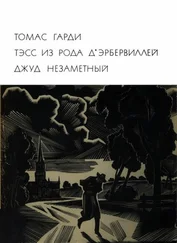| Joan stated that they were in dreadful difficulty; the autumn rains had gone through the thatch of the house, which required entire renewal; but this could not be done because the previous thatching had never been paid for. New rafters and a new ceiling upstairs also were required, which, with the previous bill, would amount to a sum of twenty pounds. |
Джоан сообщала, что они находятся в бедственном положении: после осенних дождей начала протекать кровля, нужно перекрыть дом заново, а сделать этого нельзя, потому что за старую кровлю еще не уплачено; необходимо также переменить балки и починить потолок в верхней комнате. А все это, включая и крышу, обойдется в двадцать фунтов. |
| As her husband was a man of means, and had doubtless returned by this time, could she not send them the money? |
Так как муж ее - человек со средствами и теперь, конечно, уже вернулся, то не может ли она выслать им денег? |
| Tess had thirty pounds coming to her almost immediately from Angel's bankers, and, the case being so deplorable, as soon as the sum was received she sent the twenty as requested. |
Тэсс как раз получила тридцать фунтов от банкиров Энджела и немедленно послала двадцать домой, чтобы облегчить плачевное положение родителей. |
| Part of the remainder she was obliged to expend in winter clothing, leaving only a nominal sum for the whole inclement season at hand. |
Остальные деньги пришлось чуть ли не все истратить на зимнюю одежду, и на руках у нее осталась незначительная сумма, на которую нельзя было прожить зиму. |
| When the last pound had gone, a remark of Angel's that whenever she required further resources she was to apply to his father, remained to be considered. |
Израсходовав последний фунт, она принуждена была вспомнить слова Энджела, который предлагал ей обратиться в случае необходимости к его отцу. |
| But the more Tess thought of the step, the more reluctant was she to take it. |
Но чем больше думала об этом Тэсс, тем меньше хотелось ей последовать совету Клэра. |
| The same delicacy, pride, false shame, whatever it may be called, on Clare's account, which had led her to hide from her own parents the prolongation of the estrangement, hindered her owning to his that she was in want after the fair allowance he had left her. |
Та же деликатность, гордость или ложный стыд -не все ли равно, как назвать это чувство, заставлявшее ее ради Клэра скрывать от родителей, что она по-прежнему живет в разлуке с ним, - мешали ей признаться его родным в недостатке, средств: ведь Клэр оставил ей солидную сумму. |
| They probably despised her already; how much more they would despise her in the character of a mendicant! |
Быть может, они и теперь ее презирают - и будут презирать еще больше, если она предстанет перед ними в роли попрошайки. |
| The consequence was that by no effort could the parson's daughter-in-law bring herself to let him know her state. |
В результате этих размышлений никакая сила в мире уже не смогла бы заставить невестку священника сообщить ему о своем положении. |
| Her reluctance to communicate with her husband's parents might, she thought, lessen with the lapse of time; but with her own the reverse obtained. |
Быть может, со временем ей легче будет завязать сношения с родителями мужа, размышляла Тэсс. |
| On her leaving their house after the short visit subsequent to her marriage they were under the impression that she was ultimately going to join her husband; and from that time to the present she had done nothing to disturb their belief that she was awaiting his return in comfort, hoping against hope that his journey to Brazil would result in a short stay only, after which he would come to fetch her, or that he would write for her to join him; in any case that they would soon present a united front to their families and the world. |
Что же касается ее родителей, то тут дело обстояло иначе. Когда она уехала, прожив у них несколько дней после свадьбы, они решили, что Тэсс в конце концов помирится с мужем; с тех пор она ни разу не поколебала их уверенности в том, что благоденствует и ждет его возвращения из Бразилии. Вопреки всему она надеялась, что его поездка не затянется и он вернется к ней или напишет, чтобы она сама приехала к нему; и в том и в другом случае они рука об руку предстанут перед своими родными и перед всем миром. |
| This hope she still fostered. |
Эту надежду она упорно лелеяла. |
| To let her parents know that she was a deserted wife, dependent, now that she had relieved their necessities, on her own hands for a living, after the clat of a marriage which was to nullify the collapse of the first attempt, would be too much indeed. |
Признаться родителям после блестящего брака, который должен был загладить первую неудачу, что она - покинутая жена, и теперь, оказав им помощь, вынуждена сама зарабатывать себе кусок хлеба, - было сверх ее сил. |
| The set of brilliants returned to her mind. |
Она вспомнила о бриллиантах. |
| Where Clare had deposited them she did not know, and it mattered little, if it were true that she could only use and not sell them. |
Куда отдал их на хранение Клэр, она не знала, да это и не имело значения, если она действительно могла только носить их, но не продавать. |
| Even were they absolutely hers it would be passing mean to enrich herself by a legal title to them which was not essentially hers at all. |
Даже если бы они находились в полном ее распоряжении, подлостью было бы их продать, на том основании, что они принадлежат ей по закону, тогда как, в сущности, она не имеет на них права. |
| Meanwhile her husband's days had been by no means free from trial. |
Между тем жизнь ее мужа была далеко не легкой. |
| At this moment he was lying ill of fever in the clay lands near Curitiba in Brazil, having been drenched with thunder-storms and persecuted by other hardships, in common with all the English farmers and farm-labourers who, just at this time, were deluded into going thither by the promises of the Brazilian Government, and by the baseless assumption that those frames which, ploughing and sowing on English uplands, had resisted all the weathers to whose moods they had been born, could resist equally well all the weathers by which they were surprised on Brazilian plains. |
В это время он лежал больной, в лихорадке, близ Куритибы в Бразилии, так как не раз промокал до костей во время гроз и испытывал тяжкие лишения, как и все английские фермеры и батраки, которые в ту пору соблазнились обещаниями бразильского правительства, напрасно надеясь, что, привыкнув обрабатывать английские поля во всякую погоду, они так же легко привыкнут ко всему, чем их может удивить климат Бразилии. |
| To return. |
Вернемся к Тэсс. |
| Thus it happened that when the last of Tess's sovereigns had been spent she was unprovided with others to take their place, while on account of the season she found it increasingly difficult to get employment. |
Ее последний соверен был истрачен, новых взять было неоткуда, а в эту пору года, как она убедилась, найти место оказалось чрезвычайно трудно. |

![Томас Вулф - Взгляни на дом свой, ангел [английский и русский параллельные тексты]](/books/32195/tomas-vulf-vzglyani-na-dom-svoj-angel-anglijskij-thumb.webp)
![Агата Кристи - На краю [английский и русский параллельные тексты]](/books/32247/agata-kristi-na-krayu-anglijskij-i-russkij-paralle-thumb.webp)
![Сакс Ромер - Ведьмино отродье [английский и русский параллельные тексты]](/books/33237/saks-romer-vedmino-otrode-anglijskij-i-russkij-thumb.webp)
![Агата Кристи - Объявлено убийство [английский и русский параллельные тексты]](/books/33247/agata-kristi-obyavleno-ubijstvo-anglijskij-i-russ-thumb.webp)
![Фрэнсис Фицджеральд - По эту сторону рая [английский и русский параллельные тексты]](/books/34130/frensis-ficdzherald-po-etu-storonu-raya-anglijskij-thumb.webp)

